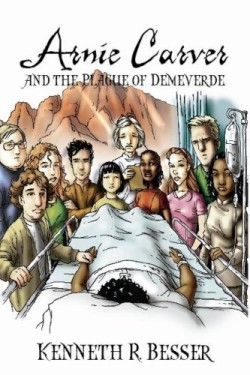Arnie Carver and the Plague of Demeverde
The richest and possibly brightest teen alive in the year 2024 Thayne Davidson Miller III has only the butler for a friend the “gentlemen’s gentleman” who raised him. The family’s business empire makes tight security necessary for fear of kidnapping. At age thirteen this prodigy of photographic memory is qualified to practice medicine and law but matches the social experience of the boy in the bubble. Sudden violent deaths serve as Thayne’s catalyst to break into society. The investigation into the incident is a thread left unknotted presumably to be resolved in another installment.
Under protection of the new pseudonym of Arnie Carver he enrolls in a boarding school for super-able geniuses on the mid-Atlantic island-nation of Demeverde. The utopian community is a gadget hound’s nirvana with prototypes for all manner of conveniences created by the island’s inventors and manufacturers available first to the students. The regimen is a mix of academic physical and spiritual instruction with the students living and competing in diverse teams of ten. When a fatal illness arises Arnie leads his team in an effort to identify the source. A plot complication strikes a blow for vegetarianism a preference also modeled by several teammates.
The cornerstone aphorism governing interpersonal behavior on Demeverde is: “‘We do not impose ourselves on others nor do we appreciate those who do.’” The benevolent but unchecked leader Unius stresses mutual cooperation and self-improvement to match full potential. After welcoming Arnie to the school Unius stays occupied with international affairs but he’s privy to unrestricted electronic observation of students and citizens.
This story’s area of slight deficiency is the villain billionaire capitalist Gregory Scorsos whose impact on the main action is tardy in appearing. His greed-driven actions do little to directly hinder the hero though they arbitrarily strike someone close by. Scorsos may harbor a motivation to harm Arnie but the too-distant villainy is a threat to world health more generally albeit with damaging consequences to Demeverde as well.
The author’s boyhood included many cross-cultural friendships a type of link he projects into the future as being so common that no one notices it anymore. Conflicts and positive aspects of a boarding school environment draw upon personal experience but it appears that J.K. Rowling’s Hogwarts was also an oblique influence. Knowledge of young people’s group dynamics stems from fifteen years service as a stay-at-home dad to six.
Arnie Carver and the Plague of Demeverde handily succeeds as a series opener introducing a stakeable protagonist who still has room to grow. The entertaining setting is underpinned by ideals of tolerance involvement team effort and the sovereignty of the individual. Besser’s hero is so imbued with integrity that neither a background of limitless privilege and or ease with intellectual achievement will dampen the loyalty of supportive readers. Widely recommended for young adults.
Reviewed by
Todd Mercer
Disclosure: This article is not an endorsement, but a review. The publisher of this book provided free copies of the book and paid a small fee to have their book reviewed by a professional reviewer. Foreword Reviews and Clarion Reviews make no guarantee that the publisher will receive a positive review. Foreword Magazine, Inc. is disclosing this in accordance with the Federal Trade Commission’s 16 CFR, Part 255.

